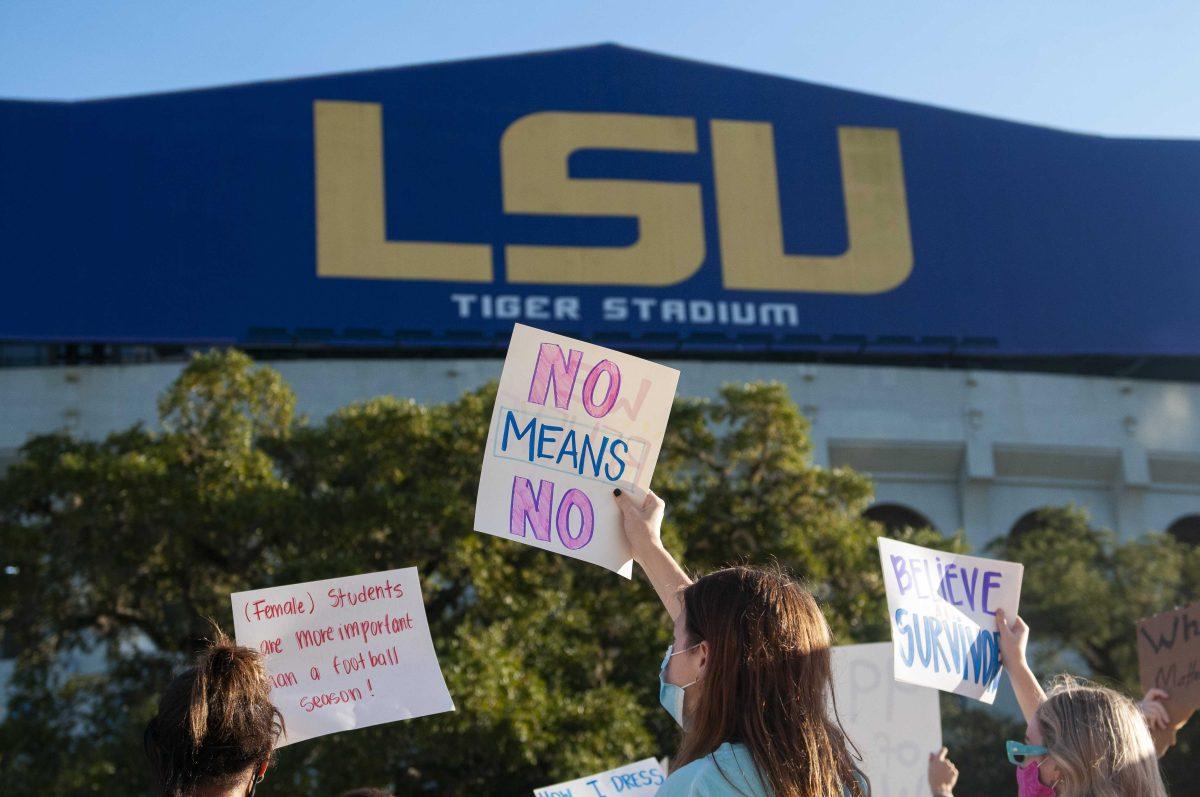Nearly seven months have passed since a USA TODAY investigation into LSU’s mishandling of Title IX cases lit a fire in Baton Rouge. Since then, much has been revealed about the shortcomings of the university and its officials in preventing and investigating sexual assault and domestic violence.
USA TODAY’s most recent reporting proves these issues extend far beyond our own campus.
An investigation by reporter Kenny Jacoby revealed violations and sidesteps of Act 172 — a law enacted in 2015 that required communication between police departments and college campuses about sex crime reports against students — enabled former student Victor Daniel Silva to transfer between LSU, University of Louisiana at Lafayette and Louisiana Tech to avoid investigation and accountability for sexual misconduct reports.
During his time in college, a total of at least six women reported sexual misconduct by Silva.
Two months into his freshman year at LSU, Silva was accused of rape by a female classmate. When he transferred to ULL the next semester, the college was unaware of this allegation, as LSU had cleared him of wrongdoing in their investigation (an investigation that took place during a time in University history where there was still no full-time Title IX employee) and failed to notify the woman of her right to report at ULL.
So when Silva was arrested for second-degree rape against another LSU student during his first semester at ULL that winter, administrators believed it to be an isolated incident, placing Silva on a two-year probation and ordering counseling.
Silva completed the two-year probation without incident, or rather, that was what was believed by ULL at the time. In reality, over the course of his probation, three more women brought sexual misconduct allegations against Silva to the Lafayette Police Department. The LPD was required to report such crimes to ULL’s Title IX Coordinator under Act 172, but did not do so.
“At best, it is a complete, callous disregard for what victims are going through — and not just what they’re going through, but what the future victims will go through, as these predators find new victims,” J.P. Morrell, who sponsored Act 172 when he was a state senator, told USA TODAY. “At worst, it’s almost malicious.”
Not long after his two year suspension ended, Silva transferred to Louisiana Tech. Social media posts circulated warning students of Silva’s past conduct, but to the university itself, it appeared Silva had a clean record. Act 172 was not enacted until two months after Silva’s probation at ULL had begun, and administrators used this as an excuse not inform Louisiana Tech that Silva had been on probation for rape.
Three months after his transfer, Silva was accused of sexual assault by a female student at Louisiana Tech. Three days after the Title IX report was filed against him, he left the school. Administrators said that because of his quick departure, they had not started an investigation, which enabled Silva to transfer back to ULL. One of the central purposes of Act 172 is to safeguard against this type of evasion of investigation, but an institutional disregard for the law allowed Silva to escape accountability once again.
Silva graduated from ULL in 2020 with a degree in chemical engineering. His then-girlfriend’s friend told USA Today that he sexually assaulted her days before he received his diploma. She chose not to report the encounter.
The ways in which colleges and police departments circumvented the guidelines in Act 172 — a piece of legislation crafted to protect students on college campuses from sexual assault — are deeply troubling.
An incredible amount of pain may have been avoided if not for the gross negligence and incompetence of these institutions — institutions that claim to act in the best interests of their community. These violations of Act 172 enabled a serial sexual abuser to assault women at three different Louisiana public colleges. One cannot help but wonder how many survivors these institutions have failed over the years, and how many other abusers they have enabled.
Still, these colleges refuse to admit any wrongdoing, either claiming they did the best they could or citing loopholes in Act 172 that supposedly absolve them of culpability. The intention of the law and its guidelines were exceedingly clear; operating on a technicality in order to avoid protecting students is hardly less disgraceful than violating the law outright (which, to be clear, occurred as well).
It is shameful that these colleges not only failed their students so miserably, but have not even the decency to recognize the trauma they perpetuated. The sad truth is that these colleges are more interested in avoiding a lawsuit than addressing the ways in which they have betrayed their students.
This report is a referendum on sexual violence prevention on college campuses in Louisiana. The state must launch a thorough investigation into violations of Act 172 committed by police departments and public colleges. Broken Title IX systems across the state require urgent reform, and individuals who did not follow the law should be held responsible.
The trust between female students and their college administrations has grown increasingly strained. These horrifying displays of institutional apathy suggest that the well-being of women on campus rank low on the priority lists of these institutions. These systemic problems persist, at least in part, because of a prevailing culture that fundamentally undervalues women.
That culture, the systems it feeds and the individual negligence it enables must be addressed once and for all.
Claire Sullivan is an 18-year-old coastal environmental science sophomore from Southbury, CT.






